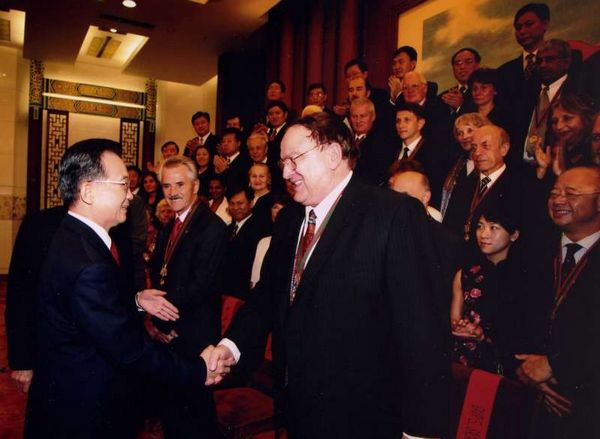Fortune favors 500 as China courts foreign advisors
- By Zhang Junmian
 0 Comment(s)
0 Comment(s) Print
Print E-mail
China.org.cn, December 21, 2011
E-mail
China.org.cn, December 21, 2011
"From these statistics, I can assert that China's economy is overheated," the 1981 Nobel Prize laureate James Tobin said in Chongqing on September 2, 1985. Tobin continued: "China, facing the risk of serious inflation, should immediately implement simultaneously tight fiscal, monetary and income policies."
In the same year, more than ten world-renowned foreign economists participated in the International Conference on China's Macro-Economic Reform, better known as the "Bashan Cruise Conference". With their financial expertise, these economists helped China to work out solutions to tackle the country's overheating economy and advance its far-reaching economic reforms.
Since China's reform and opening-up in 1978, there has been an increasingly popular trend for both the central and local governments to employ foreign consultants as economic advisors.
 |
|
In September 1985, more than ten world-renowned foreign economists, including the 1981 Nobel Prize laureate James Tobin, participated in the International Conference on China's Macro-Economic Reform, better known as the "Bashan Cruise Conference". [i.telegraph.co.uk] |
The 15 consultants were invited to meet provincial government officials and share their views on how to encourage transformation and upgrading, and create new advantages for local economic development.
With the exception of U.S. Carnegie Mellon University President Jared L. Cohon, all the consultants are senior managers from current Fortune Global 500 companies.
Guangdong has long practiced the strategy of employing foreign consultants. The province's consultative conference has been held eight times since its inception in 1999.
During this time, a total of 130 foreign consultants, ,including senior leaders from 48 of the world's top 500 multinationals such as IBM, ABB and Emerson, and experts or scholars from leading scientific research institutions have been hired as economic advisors to the provincial governor.
It's reported that these professionals are also on the consultant guest lists for governments in such mega-cites as Beijing, Shanghai and Chongqing.
|
|
|
Hans-Joerg Bullinger, president of Fraunhofer-Gesellschaft and senior consultant for Guangdong provincial government officials, receives an interview with Southcn.com in Guangzhou on Nov. 15, 2011. [news.southcn.com] |
"To boost industrial transformation and upgrading, we must give top priority to the development of a modern service industry," said Zhu Xiaodan, acting governor of Guangdong. "If not, the local economy will come to a standstill due to the existing industrial structure."
Guangdong is not the first province to employ foreign advisors. Shanghai set the trend as early as 1989, when it began hosting the International Business Leaders' Advisory Council for the Mayor of Shanghai. The council was a response to the late Chinese leader Deng Xiaoping's 1983 call to "beef up reform and opening-up with more help from foreign brains".
In September, Chongqing held its latest economic consultation meeting, presenting the mayor with a glamorous cast of new advisors, including Schneider Electric CEO Jean-Pascal Tricoire, SK Group Board Chairman Chey Tae-won, and Cisco Executive Vice President Wim Elfrink.
Beijing, like Guangdong, launched its consultative meeting with foreign advisors in 1999, aiming to include more top figures from the world of international business. Its annual meeting in 2003 attracted preeminent senior managers from 19 leading transnational corporations, 18 of which were ranked among the world's top 500.
An official from the Guangdong government told Xinhua's Oriental Outlook magazine that advice from, and cooperation with transnational companies is highly valued by local governments.
At the latest meeting in Guangdong in November, many foreign companies, including Fraunhofer-Gesellschaft, Novartis AG and General Electric, signed cooperation agreements with the local government. Most notably, British Petroleum (BP) said it planned to invest an additional US$600 million in building the world's largest PTA manufacturing base in Zhuhai.
According to the Chongqing Foreign Trade and Economic Relations Commission, many senior leaders of global 500 companies hold the title of "Mayor's Economic Advisor" in high esteem, as this identity could help them to develop a closer relationship with the local government and thus seize more business opportunities.
|
|
|
In 2006, Chinese premier Wen Jiabao presents the National Friendship Award, China's highest-ranking prize for foreign experts, to Gavriel Salvendy, the first director of the Department of Industrial Engineering at China's Tsinghua University, who has turned the fledgling department into the most outstanding in its category across the country. [sina.com.cn] |
Li Minghua, deputy to the People's Congress of Guangzhou, commented that the government should attach equal importance to proposals from local experts. "Unlike their Chinese peers who usually have a long-term systematic focus on a certain problem, foreign advisors can't focus their research consistently over long periods. Instead, they submit rushed, last-minute reports after staying in China for only a short time."
Wang believes that striking a balance is the key to maximizing the benefits of having foreign advisors. "Sometimes, if the valuable and useful advice from them [foreign advisors] is not taken seriously, there's no point in bringing in foreign talents. If nobody listens to other voices as well, the conference will merely become a talking shop."








Go to Forum >>0 Comment(s)